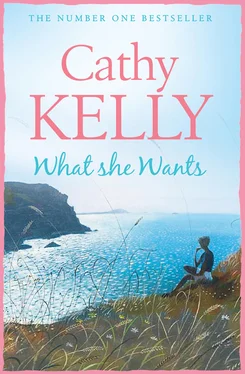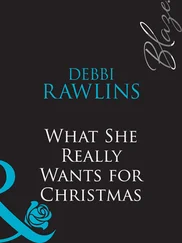My god, I’m turning into a boring old cow, Hope told herself as she processed Mrs Payton’s savings book. This woman is eighty if she’s a day and she’s all fired up about a trip to Greece, while I’m only thirty-seven and I’m whinging about going the short trip to Ireland.
When she was gone, Yvonne was busy with some teenage boys, and then a stream of people kept coming into the office, all with complicated business. It was nearly closing time before they had a chance to talk. Denise was making tea in the cubby hole kitchen behind the photocopier because they’d been too busy to have their afternoon tea break.
‘Don’t go,’ said Yvonne.
‘It’s not that easy.’ Hope was fed up with the whole subject.
‘It is,’ asserted Yvonne. ‘Can you imagine what you’ll feel like when you’re there if you’re this depressed now? You’ll be down the doctor looking for tablets for your nerves like a shot.’
Hope laughed. ‘I think I need tablets for my nerves as it is,’ she joked.
Yvonne didn’t laugh. ‘Yeah and you’ll be on double strength ones when you’re dying of depression next month. Think about it, you’ll be away from your friends, your sister, everyone. It’s not fair to expect you to go along with this.’ Yvonne scowled. ‘Men can be right bastards, you know.’
‘It is only for a year,’ Hope said.
‘Hope, you’re the sort of person who wouldn’t expect someone to sit through a two-hour film you’d like in case they didn’t enjoy it. You never ask anyone for anything. Matt’s asked you to do this huge thing and you don’t want to go but you don’t want to say no either. There’s a fine line between keeping the peace and getting walked on, as my mother would say. And what are you going to do? You love working, even here, you’ll go out of your head with no job. Matt’s asking too much.’
Hope took her tea from Denise and thought of what Yvonne would say if she knew that Matt hadn’t really asked her anything: he’d told her, wheedled a bit, and had assumed she’d go along with it. She was so happy that he wasn’t having an affair, she’d said yes quicker than a hooker touting for business on a rainy night.
Yvonne would levitate with temper if she knew the truth. ‘My Freddie wouldn’t dream of doing anything like that,’ she’d say, and it was true. Freddie had to work hard to keep Yvonne. She was not the sort of person who got walked on. As far as Yvonne was concerned, if anyone was going to do any trampling over anyone else, she’d do it, thank you very much.
‘It’s what everyone dreams of, Yvonne,’ protested Hope. ‘Giving up the rat race to live in the country, spend quality time with the children and not work.’
‘Yeah right,’ said Yvonne grimly. ‘You and your winning the lottery dream. Except if you won the lottery and bought some palatial mansion down the road, you might not be working but you’d have the cash to do whatever you wanted and you’d be able to afford to have someone look after the kids if you wanted to get the chauffeur to drive you into town. You haven’t won the lottery, but I reckon Matt has.’
For the rest of the afternoon, Hope thought about leaving Witherspoon’s. She did love her job, Yvonne was right. She didn’t want to be some high flying executive like Sam but she enjoyed working, enjoyed having her own money and her independence, and liked meeting new people. Of course she adored the children, but surely she wasn’t a bad mother to want to combine loving them with a job?
Right on cue, the heavens opened as Hope ran, raincoatless, to her car after work. It was only a five-minute walk but by the time she wrenched the door of the Metro open and flung her handbag onto the passenger seat, she was soaked.
Shivering despite having the heater on at full blast, she drove home in worse than usual traffic. Yvonne didn’t understand. Yvonne was a blunt person who said what she thought. Hope was exactly the opposite. She longed for some way of telling Matt she didn’t want to leave Bath, but without the inevitable confrontation. Ideally, she wanted him intuitively to work out what she wanted, the way men did in films, and then agree that it was all a mad idea and that they should stay at home. No hassle, no arguments.
Only it wasn’t working out like that. Matt appeared to be taking her stoic silence for a thoughtfulness, as if she was busy mentally working out what the family would need to take. Why didn’t he see that she was upset? How could he be so blind?
The clock on the dashboard said it was six fifteen when Hope pulled up outside Your Little Treasures, not caring that she was double parked. Head down against the rain, she ran up the path to the glossy pillar box red door.
Marta was standing sentry in the small hallway, looking less Rottweiler-like than usual on account of her upswept hairstyle and a very un-Marta-like lacy dress. She was obviously going out for the evening.
‘You’re late,’ she snapped as Hope reached her.
The build-up of misery over the past few days came to a triumphant head in Hope’s mind. ‘So sue me,’ she snapped back with unheard of venom.
Marta took a step back at this unprecedented attack from the meek and mild Mrs Parker.
‘As long as it’s just this once,’ she muttered, giving Hope a wide berth.
Matt couldn’t remember when he’d felt this fired up over anything. Not the local television ads they’d won off a top London ad agency, not the excitement he’d felt when Hope had first become pregnant. Nothing had ever given him the buzz that this new adventure was giving him.
He arrived home with a bouquet of flowers for Hope and a bottle of rosé wine. She loved rosé. She was a bit unsure about the whole trip, but that was just Hope. Dear Hope, he loved her despite her nervousness about things and her fear of the unknown. She’d love Kerry when she got there.
Matt remembered when he was nine, and his parents, to whom he’d been an unexpected interruption in their marriage and careers, had shipped him off to Uncle Gearóid’s. At first, he’d hated the idea of leaving his home to travel to Ireland, but after that first summer, he’d wanted to go every year.
There was something magical about Redlion. Maybe it was the fact that Gearóid didn’t believe in rules so there was none of that palaver about being in by a certain time or eating three meals a day, but Matt had loved it.
Meals were whenever Gearóid took it upon himself to open a tin of beans and nobody batted an eyelid when the nine-year-old Matt was brought into the local pub (shop at the front and small snug at the back) to have his first taste of porter. They’d gone on fishing expeditions, on wild adventures to the Beara Peninsula, where Gearóid had practically gone into a coma after a drinking session with a fellow writer in a small hillside dwelling that Matt’s mother would have disapproved of no end. Matt had grown up with a mistily romantic memory of sitting on cracked leather stools in the dim, stained snug, listening to farmers talking of their herds and the trials of bovine mastitis, while Gearóid and his cronies rambled on about novels and poems, their plans for being the next Yeats, and how they’d got a consignment of good quality poteen and maybe after the next round they’d take a ramble back to Curlew Cottage for a wee dram.
Gearóid, with his wild woolly hair, long beard and fondness for brown corduroy suits he got directly from Dublin, had been an idol to his nephew. He lived outside the system, he told Matt proudly, which was why he’d left his home in Surrey to travel to Kerry and become a writer. Taking the Irish version of his real name had been part of the fun. The one-time Gerry had become Gearóid, more Irish than the Irish, a man who could sing old Irish songs for hours on end and knew the location of every stone circle in Munster. Gearóid supplemented his income by giving tours to the hordes of tourists who came to Kerry searching for their roots, but, as he got older, his fondness for the jar meant he was quite likely to turn on them and tell them they were all a pack of feckers and should feck off back wherever they came from.
Читать дальше












